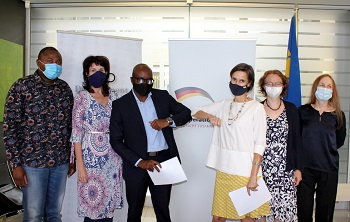
Namibia largest recipient of German development cooperation in Africa per capita – Embassy

The Minister for Economic Planning and Director General of the National Planning Commission, Hon Obeth Kandjoze, and the German Ambassador, HE Christian Schlaga, signed a Financial Grant and a Technical Cooperation Agreement this week.
The inking of the agreements follows the 2017 Governmental Negotiations on Development Cooperation between Germany and Namibia.
According to a joint media statement, to date, German development cooperation with Namibia – governmental and non-governmental programmes taken together amounts to more than 1 billion Euros, approximately N$15 billion.
“In per-capita terms, Namibia is thus the largest recipient of German development cooperation in Africa,” the statement read.
According to the statement the two agreements inked cover programmes to the value of roughly N$1.1 billion, financing among others projects on Bush Control and Biomass Utilisation, Promotion of Vocational Education and Training, Promotion of Business Advisory and Transformational Services, Support to Management of Public Enterprises, Integrated Wildlife Protection Management and Integrated National Park Management.
“These agreements are complemented by a Financial Cooperation Agreement on interest-subsidized loans, to be concluded with the Ministry of Finance,” they added.
Meanwhile these agreements are concluded at government negotiations that take place roughly every two years.
At the last round of negotiations, Namibia and Germany have agreed on three focal areas of the partnership, namely: Natural Resources Management, Sustainable Economic Development Transport/Logistics.
“Within the priority areas, the emphasis is on key issues for tomorrow’s world, such as a modern financial sector, natural resource management as a basis for tourism and agriculture, modern vocational training, logistics and, last but not least, energy efficiency and renewable energies,” they said.
Furthermore to bilateral government cooperation, there are a large number of programmes run by non-governmental players such as churches, political foundations, NGOs or private initiatives.
“The German government regards the contributions of these organizations as an important complement to governmental development cooperation and supports them financially,” they added.
The next round of negotiations on development cooperation is foreseen for 2019.












































